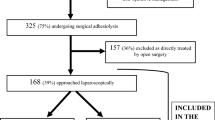Abstract
Background
Risk of adhesive small-bowel obstruction (SBO) is high following open colorectal surgery. Laparoscopic surgery may induce fewer adhesions; however, the translation of this advantage to a reduced rate of bowel obstruction has not been well demonstrated. This study evaluates whether SBO is lower after laparoscopic compared with open colorectal surgery.
Methods
Patients who underwent laparoscopic abdominal colorectal surgery, without any previous history of open surgery, from 1998 to 2010 were identified from a prospective laparoscopic database. Details regarding occurrence of symptoms of SBO (colicky abdominal pain; nausea and/or vomiting; constipation; abdominal distension not due to infection or gastroenteritis), admissions to hospital with radiological findings confirming SBO, and surgery for obstruction after the laparoscopic colectomy were obtained by contacting patients and mailed questionnaires. Patients undergoing open colorectal surgery for similar operations during the same period and without a history of previous open surgery also were contacted and compared with the laparoscopic group for risk of obstruction.
Results
Information pertaining to SBO was available for 205 patients who underwent an elective laparoscopic procedure and 205 similar open operations. The two groups had similar age, gender, and sufficiently long duration of follow-up. Despite a significantly longer duration of follow-up for the laparoscopic group, admission to hospital for SBO was similar between groups. Patients who underwent laparoscopic surgery also had significantly lower operative intervention for SBO (8% vs. 2%, p = 0.006).
Conclusions
Although the rate of SBO was similar after laparoscopic and open colorectal surgery, the need for operative intervention for SBO was significantly lower after laparoscopic operations. These findings especially in the context of the longer follow-up for laparoscopic patients suggests that the lower incidence of adhesions expected after laparoscopic surgery likely translates into long-term benefits in terms of reduced SBO.
Similar content being viewed by others
References
Hull TL, Joyce MR, Geisler DP, Coffey JC (2012) Adhesions after laparoscopic and open ileal pouch-anal anastomosis surgery for ulcerative colitis. Br J Surg 99(2):270–275
Indar AA, Efron JE, Young-Fadok TM (2009) Laparoscopic ileal pouch-anal anastomosis reduces abdominal and pelvic adhesions. Surg Endosc 23(1):174–177
Ryan MD, Wattchow D, Walker M, Hakendorf P (2004) Adhesional small bowel obstruction after colorectal surgery. ANZ J Surg 74(11):1010–1012
Ray NF, Denton WG, Thamer M, Henderson SC, Perry S (1998) Abdominal adhesiolysis: inpatient care and expenditures in the United States in 1994. J Am Coll Surg 186(1):1–9
Bhardwaj R, Parker MC (2007) Impact of adhesions in colorectal surgery. Colorectal Dis 9(Suppl 2):45–53
MacLean AR, Cohen Z, MacRae HM, O’Connor BI, Mukraj D, Kennedy ED et al (2002) Risk of small bowel obstruction after the ileal pouch-anal anastomosis. Ann Surg 235(2):200–206
Rosin D, Zmora O, Hoffman A, Khaikin M, Bar Zakai B, Munz Y et al (2007) Low incidence of adhesion-related bowel obstruction after laparoscopic colorectal surgery. J Laparoendosc Adv Surg Tech A 17(5):604–607
Scholin J, Buunen M, Hop W, Bonjer J, Anderberg B, Cuesta M et al (2011) Bowel obstruction after laparoscopic and open colon resection for cancer: results of 5 years of follow-up in a randomized trial. Surg Endosc 25(12):3755–3760
Duepree HJ, Senagore AJ, Delaney CP, Fazio VW (2003) Does means of access affect the incidence of small bowel obstruction and ventral hernia after bowel resection? Laparoscopy versus laparotomy. J Am Coll Surg 197(2):177–181
Disclosures
Drs. Avraham Reshef, Tracy Hull, and Ravi Kiran have no conflict of interest or financial ties to disclose.
Author information
Authors and Affiliations
Corresponding author
Rights and permissions
About this article
Cite this article
Reshef, A., Hull, T.L. & Kiran, R.P. Risk of adhesive obstruction after colorectal surgery: the benefits of the minimally invasive approach may extend well beyond the perioperative period. Surg Endosc 27, 1717–1720 (2013). https://doi.org/10.1007/s00464-012-2663-z
Received:
Accepted:
Published:
Issue Date:
DOI: https://doi.org/10.1007/s00464-012-2663-z




